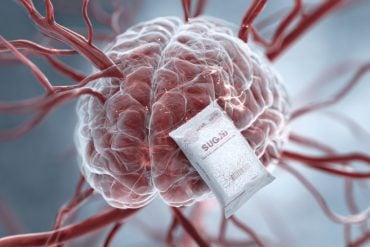Summary: Sleep significantly bolsters our brain’s ability to consolidate complex associations within episodic memories. The research demonstrates that sleep not only strengthens weak connections between different elements of an event but also fosters new links among previously unconnected aspects, enhancing the process known as pattern completion.
This enhancement is closely tied to sleep spindles, bursts of brain activity during sleep associated with memory consolidation. These findings highlight sleep’s critical role in weaving together multifaceted memories, suggesting an evolutionary advantage in our ability to construct a coherent understanding of our experiences and predict future occurrences.
Key Facts:
- Sleep’s Role in Memory: Sleep specifically improves memory by consolidating weak associations and creating new connections between elements of complex events.
- Importance of Sleep Spindles: The study links the memory consolidation process to sleep spindles, indicating their crucial role in integrating complex associations.
- Evolutionary Advantage of Sleep: The research suggests that the ability to integrate and complete memories of complex events provides an evolutionary advantage in understanding our environment and predicting future events.
Source: LMU
Researchers had known for some time that sleep consolidates our memories of facts and episodic events. However, the research to date has concentrated mainly on simple associations – that is to say, connections between elements, such as we make when learning new vocabulary.
“But in real life, events are generally made up of numerous components – for example, a place, people, and objects – which are linked together in the brain,” explains Dr. Nicolas Lutz from LMU’s Institute of Medical Psychology. These associations can vary in strength and some elements might be connected with each other only indirectly.

“Thanks to the neural connections that underlie these associations, a single cue word is often all it takes for somebody to recall not only individual aspects of an event but multiple aspects at once.”
This process, which is known as pattern completion, is a fundamental feature of episodic memory. Lutz is lead author of a study recently published in the journal Proceedings of the National Academy of Sciences (PNAS), which investigated the effect of sleep on memory of such complex events.
After the study participants had learned events with complex associations, in one condition they spent the night in a sleep laboratory, where they were allowed to sleep as usual, while in another condition, they had to stay up all night. In both conditions, the participants were allowed to spend the following night at home to recover. Then they were tested on how well they could recall different associations between elements of the learned events.
“We were able to demonstrate that sleep specifically consolidates weak associations and strengthens new associations between elements that were not directly connected with each other during learning. Moreover, the ability to remember multiple elements of an event together, after having been presented with just a single cue, was improved after sleep compared to the condition in which the participants had stayed awake,” summarizes Nicolas Lutz.
This demonstrates the importance of sleep for completing partial information and processing complex events in the brain.
By monitoring the brain activity of the study participants during sleep, the authors of the study were also able to show that the improvement in memory performance is connected with so-called sleep spindles – bursts of neural oscillatory activity during sleep, which are associated with the active consolidation of memory contents. This occurs through reactivation of the underlying neural structures while sleeping.
“This finding suggests that sleep spindles play an important role in the consolidation of complex associations, which underlie the completion of memories of whole events,” says Professor Luciana Besedovsky, lead researcher of the study.
According to Lutz and Besedovsky, the identified effects of sleep on memory can be seen as an important adaptation of the human brain, because they help people draw a more coherent picture of their environment, which in turn enables them to make more comprehensive predictions of future events.
“And so our results reveal a new function by which sleep can offer an evolutionary advantage,” reckons Luciana Besedovsky. “Furthermore, they open up new perspectives on how we store and access information about complex multielement events.”
About this sleep and memory research news
Author: Constanze Drewlo
Source: LMU
Contact: Constanze Drewlo – LMU
Image: The image is credited to Neuroscience News
Original Research: Closed access.
“Sleep shapes the associative structure underlying pattern completion in multielement event memory” by Nicolas Lutz et al. PNAS
Abstract
Sleep shapes the associative structure underlying pattern completion in multielement event memory
Sleep supports the consolidation of episodic memory. It is, however, a matter of ongoing debate how this effect is established, because, so far, it has been demonstrated almost exclusively for simple associations, which lack the complex associative structure of real-life events, typically comprising multiple elements with different association strengths. Because of this associative structure interlinking the individual elements, a partial cue (e.g., a single element) can recover an entire multielement event.
This process, referred to as pattern completion, is a fundamental property of episodic memory. Yet, it is currently unknown how sleep affects the associative structure within multielement events and subsequent processes of pattern completion.
Here, we investigated the effects of post-encoding sleep, compared with a period of nocturnal wakefulness (followed by a recovery night), on multielement associative structures in healthy humans using a verbal associative learning task including strongly, weakly, and not directly encoded associations.
We demonstrate that sleep selectively benefits memory for weakly associated elements as well as for associations that were not directly encoded but not for strongly associated elements within a multielement event structure.
Crucially, these effects were accompanied by a beneficial effect of sleep on the ability to recall multiple elements of an event based on a single common cue. In addition, retrieval performance was predicted by sleep spindle activity during post-encoding sleep.
Together, these results indicate that sleep plays a fundamental role in shaping associative structures, thereby supporting pattern completion in complex multielement events.






